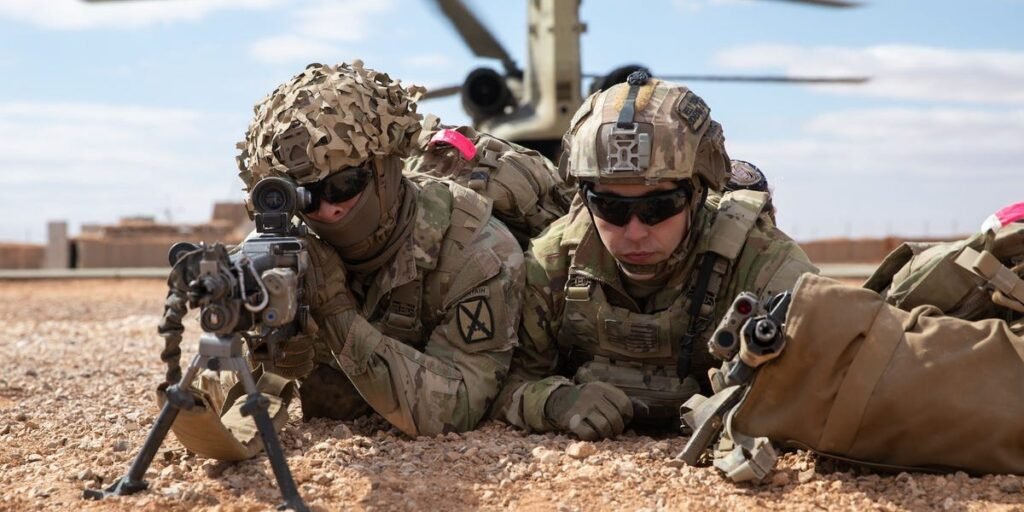The United States will begin withdrawing hundreds of troops from northeast Syria in coming months, a sign that it believes its Kurdish partners and the new Syrian government can keep ISIS extremists from reorganizing.
The US troops in Syria have assisted its local partner, the Kurdish-led Syrian Democratic Forces, in the fight against ISIS since 2015. The presence was always relatively small, never exceeding 2,500, and is being reduced to below 1,000.
“This consolidation reflects the significant steps we have made toward degrading ISIS’ appeal and operational capability regionally and globally,” Chief Pentagon spokesperson Sean Parnell said in a Friday statement. “This deliberate and conditions-based process will bring the US footprint in Syria down to less than a thousand US forces in the coming months.”
“The US is likely to keep a small residual force in Syria to conduct targeted raids against ISIS,” Nicholas Heras, senior director of strategy and innovation at the New Lines Institute, told Business Insider. “The US is also likely to keep the base in Erbil (Iraqi Kurdistan) as a hub to surge forces into Syria, as needed.”
“These factors would mean that a phased US withdrawal from Syria would be less likely to be chaotic, and more likely to adhere to a typical reduction in force.”
In October 2019, two years after ISIS lost its self-styled caliphate’s de-facto capital to the US-led coalition, President Donald Trump ordered an abrupt withdrawal, triggering a brief but destructive and destabilizing cross-border Turkish operation against the SDF. Trump ultimately postponed that hasty withdrawal and the US maintained a smaller deployment of about 900 personnel.
The latest drawdown takes place under significantly different circumstances.
“The 2019 withdrawal was so chaotic because it was a snap decision that the US administration wasn’t adequately prepared for, and which senior officials in the administration were outraged by,” Aron Lund, a fellow with Century International and a senior analyst at the Swedish Defense Research Agency, told BI.
“You don’t have that situation today,” Lund said, adding that, unlike the previous Trump administration, there are no officials who would likely resign in protest as Defense Secretary Jim Mattis did.
In December, after the overthrow of long-time Syrian dictator Bashar al-Assad, the US disclosed that it had 2,000 troops in Syria. It clarified that those additional 1,100 were “temporary rotational forces” and the remaining 900 “core” assets.
Myles B. Caggins III, a senior nonresident fellow at the New Lines Institute, retired US Army colonel, and former spokesman for the Global Coalition to Defeat ISIS, believes Washington would be “well-served” in continuing its Syria deployment.
“During the first Trump administration, the US-led global Coalition defeated ISIS by supporting the Kurdish-led SDF,” Caggins told BI. “It is important for President Trump to preserve that victory and support the SDF while they continue raids on ISIS remnants and hold 10,000 ISIS detainees.”
“The 2,000 US troops in Syria continue to blast and capture ISIS and Hurras al-Din leaders, as well as preventing Iranian-backed militants from having a land bridge to Lebanon and ultimately Israel,” Caggins said; Hurras al-Din is an al-Qaeda-affiliated group in Syria.
These continued counter-terrorism efforts coincide with improving relations between Turkey and the SDF. A ceasefire recently ended months of skirmishes between the SDF and Turkey’s Syrian militia allies.
“The situation now in eastern Syria is more fortuitous than it has been before for this type of US reduction of force,” Heras said.
The SDF also signed a landmark deal with Damascus in March that will eventually see the SDF integrated into Syria’s national armed forces. Until that deal, the US still has a crucial role to play in supporting its Kurdish-led partner.
“The new transitional Syrian government is not able to fund or staff the ISIS detention centers and Damascus tacitly welcomes the presence of US troops because they know that the well-trained, well-equipped SDF is a critical part of the future composition of the Syrian Ministry of Defense,” Caggins said.
Thousands of ISIS fighters and their families remain in prisons and open-air camps in SDF-held areas. The most notable is the sprawling Al-Hol camp near the Iraqi border in northeast Syria. The camp is an indefinite detention for an estimated 40,000 people, primarily Iraqi and Syrian nationals, many with suspected links or sympathies to ISIS. ISIS prisoners and sleeper cells have attempted to free fellow captives and regroup, most notably in January 2022 through an attempted prison break in Hasaka that took the US-backed Kurdish authorities 10 days to suppress.
Efforts to rehabilitate foreign ISIS fighters at al-Hol are ongoing. So far, an estimated half of Iraqi nationals in the camp have been repatriated, with the majority rehabilitated.
Shortly before he returned to the White House in January, Trump said that America should have nothing to do with Syria or its conflict.
Century International’s Lund believes it remains to be seen if “a more extensive pullout” of US troops from Syria and Syria’s reabsorption of SDF territories and institutions could be smoothly coordinated with Damascus and Ankara.
“If everyone shows a bit of goodwill, you could have a handover of areas and prisons and other things” from the US and SDF to the Syrian government, Lund said. “But if there’s not a deal in place when US troops start a final exit, or if there’s a deal that doesn’t hold up when tested, things could go haywire very quickly.”
“Even if we end up with just a partial reduction of forces this time, I believe the United States will probably quit Syria in Trump’s second mandate,” Lund added. “And if so, it will probably be sooner rather than later.”
Paul Iddon is a freelance journalist and columnist who writes about Middle East developments, military affairs, politics, and history. His articles have appeared in a variety of publications focused on the region.
Read the full article here


